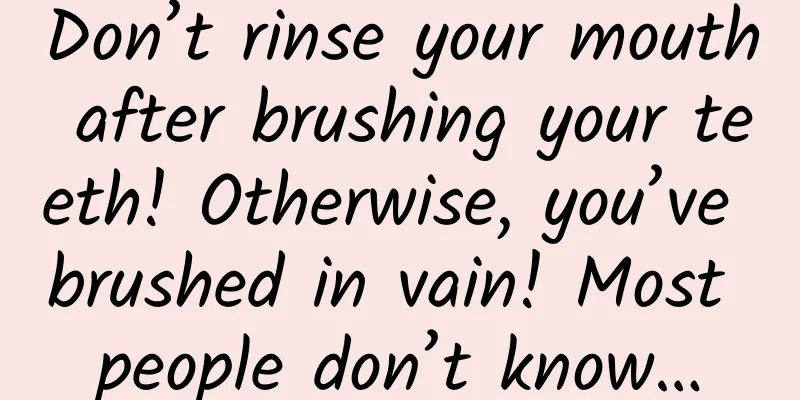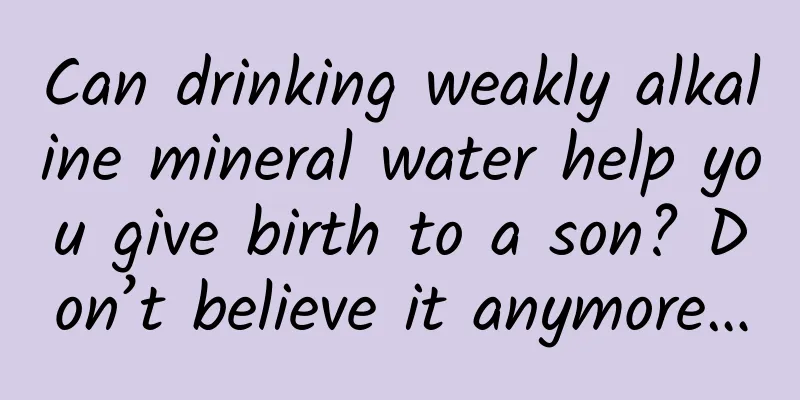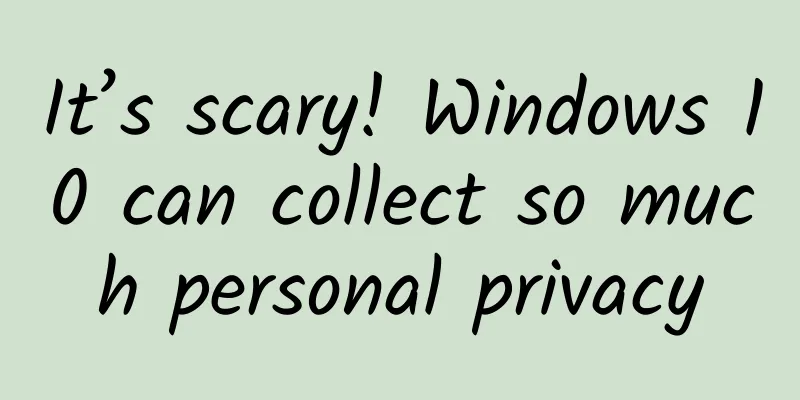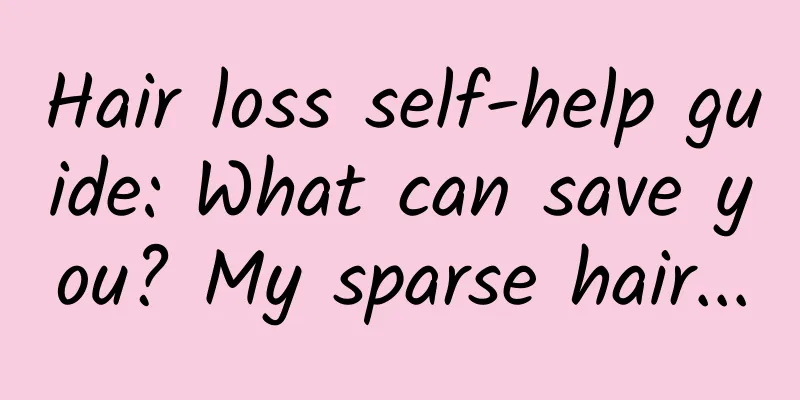Don’t rinse your mouth after brushing your teeth! Otherwise, you’ve brushed in vain! Most people don’t know…

|
What are the steps for brushing your teeth? Squeeze toothpaste, brush, rinse mouth with water, and that's it? Maybe many people do this, right? But I didn't expect that professionals recommend that you don't need to rinse your mouth after brushing your teeth, just spit out the foam in your mouth! So how does toothpaste protect our teeth, and why don’t we rinse our mouths after brushing? 01 Why brush your teeth? When food stays on the surface of teeth for a period of time, dental plaque will form on the surface of teeth. They can be understood as a "community" composed of various bacteria, which can obtain nutrients from saliva and gradually grow stronger. When it first forms, dental plaque is not easy to be found, but once the bacteria attach to the teeth, they begin to multiply wildly. They can not only obtain nutrition from saliva and food residues, but also produce and sell themselves, provide nutrients to each other, and develop to a certain scale in 1 to 2 hours. Image source: Wikipedia The mouth will never be a sterile environment, so we need to fight against the constantly formed dental plaque. If we don’t clean it carefully, it will grow bigger and stronger in the corners. If you have ever seen a soft, milky white deposit on your teeth that doesn't come off with a mouthwash, it's most likely dental plaque. Bacteria digest the sugar in saliva to produce acid, which breaks down the calcium hydroxide phosphate in the enamel, and the "demineralization" process begins. Demineralization will first weaken the enamel, and after it is stripped away, white spots will appear on the surface of the teeth. In severe cases, grooves on the surface of the teeth will be exposed. Image source: Wikipedia Over time, small cavities will be eroded on the teeth, and then turn into large areas of tooth decay. In addition to being unsightly, cavities are also very difficult to clean, and they will store a lot of residues and become a large dining hall for bacteria. If the caries cavity continues to deepen and expand, exposing the dental nerve, it will be very painful and difficult to treat. 02 How did people in ancient times solve the problem of brushing teeth? To prevent things from getting to this point, people began to pay attention to brushing their teeth since around 5000 BC. The ancient Egyptians not only used branches and leaves to make toothbrushes, but also used cow hoof ash, burnt egg shells and pumice powder to make "tooth powder" . The main function of these small particles is to help clean the stubborn plaque on the teeth. Ancient Egyptian murals may be the earliest record of people using toothpaste. Image source: natchlabs.com In ancient my country, there was also a kind of "mouth and teeth black mustache" that can make teeth whiter and fragrant, and can also reduce inflammation and relieve pain. This ointment is made from soap beans, lotus leaves, green salt and other medicines, and can be said to be the earliest medicinal toothpaste in the world. The most outrageous thing about maintaining oral hygiene was the ancient Romans. They believed that the ammonia in urine could not only clean the mouth, but also whiten teeth, so they used urine to rinse their mouths (which actually sounds reasonable)... The ancient Romans used urine for more than one purpose. In ancient Rome, there were large barrels dedicated to collecting urine on the streets. Laundry workers diluted the urine and used it to wash clothes, because laundry workers preferred ammonia to soap to remove stubborn stains on clothes. Ancient Romans washed their clothes standing in buckets of diluted urine. Image source: livejournal.com 03 Why don't you rinse your mouth after brushing your teeth? Back to teeth cleaning, people later discovered that fluoride is a powerful tool for preventing tooth decay . It can make teeth form a harder and more acid-resistant protective layer. Remember the calcium hydroxide phosphate mentioned earlier as an important component of tooth enamel? Fluoride ions can replace the hydroxide ions in it, making the acid resistance of tooth enamel stronger and fixing more calcium. This calcium fluorophosphate film is worn away when chewing food, so the teeth need to be supplemented with fluoride regularly. Some countries choose to add fluoride to tap water to prevent tooth decay . However, long-term drinking of water with excessive fluoride may cause a series of diseases, such as blood diseases, enteritis, and cancer risks in adults; children may suffer from asthma, thyroid hormone disorders, and even brain stunting. Therefore, there is a lot of controversy about drinking fluoridated water. However, some authoritative organizations have stated that as long as the exposure to drinking water is below the maximum acceptable concentration of 1.5 mg/L, there will be no adverse effects. In our daily life, the way to supplement fluoride to teeth is of course brushing. Fluoride and abrasives are the most important components in toothpaste . Abrasives are responsible for removing plaque, and fluoride is responsible for strengthening teeth. It takes us 2 to 3 minutes to brush our teeth each time, so that the toothpaste can be applied to every surface of the teeth and allow it to fully contact the teeth. In order to allow the fluoride in toothpaste to fully work, experts recommend not to rinse your mouth immediately after brushing your teeth, just spit out the excess foam. And wait at least 10 to 15 minutes before eating or drinking. Copyright images in the gallery. Reprinting and using them may lead to copyright disputes. The toothpaste that remains in the mouth contains concentrated fluoride, which mixed with saliva can continue to protect the mouth. Even if it is swallowed, it will not cause adverse consequences such as fluorosis. But this is really uncomfortable. Using mouthwash instead of water seems to be a compromise. Although the taste is hard to describe, at least the mouth is less sticky. Even so, experts say that this will dilute the concentration of fluoride in the mouth, even if you use fluoride mouthwash... The advice is to bear with it (smile). References: [1] https://en.wikipedia.org/wiki/Water_fluoridation_controversy [2] https://zh.wikipedia.org/wiki/%E6%B0%9F%E5%8C%96%E7%89%A9 [3] https://www.nhs.uk/live-well/healthy-teeth-and-gums/how-to-keep-your-teeth-clean/ [4] https://www.zhihu.com/question/20093857 [5] https://www.smithsonianmag.com/science-nature/from-gunpowder-to-teeth-whitener-the-science-behind-historic-uses-of-urine-442390/ [6] https://baike.baidu.com/item/%E7%89%99%E8%8F%8C%E6%96%91/5093064 Author: Ziv Editor of Everything Magazine Source: Bringing Science Home The cover image and the images in this article are from the copyright library Reprinting may lead to copyright disputes |
<<: Why is it called "blowing the bull's skin" instead of "blowing the sheep's skin"?
Recommend
NIO ES6 starts at RMB 180,000, with a range expected to exceed 450 kilometers
Recently, NIO disclosed in its prospectus that th...
The first generation iPhone appreciates faster than a house! It is now worth more than 2 million
According to MarketWatch, Jobs released the first...
Content Operations: How to achieve sustainable growth through content?
This article uses four steps to help newbies in e...
Polymer fluids: Uncovering the amazing science behind everyday products
summary: As a special state of existence of matte...
Three modes of mobile phone system development by Apple, Google and Microsoft
Since people entered the mobile Internet era to t...
What are the functions of the Guangzhou office leasing mini program? How much does it cost to develop a rental app?
Nowadays, many companies choose to rent an office...
Is it still worth doing new media now?
I often encounter this situation: many friends ad...
Ketchup was once popular as a medicine for 20 years. Q: Does it come with French fries?
All crops with the word "Hu" or "F...
Tea art and tea ceremony video tutorial, zero-based tea knowledge and tea brewing self-study entry-level full set Baidu network disk
Tea art and tea ceremony video tutorial, zero-bas...
Is Qingming Festival a legal holiday? What specific day is it? Attached is the Qingming Festival holiday arrangement 2022!
Qingming Festival is just a few days away. On thi...
Does a person need to "consume" 551 kilograms of oil in his lifetime? Let's talk about the "panacea" in food, clothing, housing and transportation
Science Times reporter epic When it comes to oil,...
How to make a good APP online activity promotion plan?
Everything needs a plan, and APP operation and pr...
How to use Tik Tok more efficiently? Master these five vertical screen thinking!
Why is it that when Chengdu sweet girl says “I th...
Don't buy food with these words on the package! How many do you have at home?
This article was reviewed by Pa Li Ze, chief phys...
WeChat rewards everyone with a top-of-the-line iPhone. Zhang Xiaolong: The year-end bonus is so high that it might scare everyone.
Although the overall situation in 2018 is not goo...









